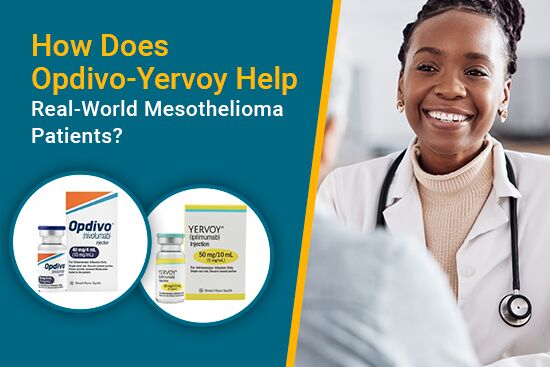Estimated Read Time: 2 minutes
In 2020, the U.S. Food and Drug Administration (FDA) approved Opdivo and Yervoy for mesothelioma. The two immunotherapy drugs were approved as a first-line treatment option for people with an unresectable malignant pleural mesothelioma.
The approval was based on the results of a phase 3 mesothelioma clinical trial called Checkmate-743. In the trial, half of patients received Opdivo and Yervoy while the other half received standard mesothelioma chemotherapy.
The median length of survival for people receiving Opdivo and Yervoy was 18.4 months. This is an improvement on chemotherapy, which led to a median survival of 14 months in the study. Mesothelioma is a fast-spreading cancer that forms near the lungs or abdominal cavity, so immunotherapy is a welcome addition to the approved treatment options.
Clinical trials can be misleading, though. Scientists have control over the patient population and can be selective about which patients enroll to improve the trial’s chances of success.
Fortunately, Opdivo and Yervoy are having similar results for real-world mesothelioma patients receiving the FDA-approved immunotherapy combination at medical centers. A study conducted in Europe reported the results in the publication “Lung Cancer.”
How Do Opdivo and Yervoy Work?
Opdivo and Yervoy are the brand names for the immunotherapy drugs nivolumab (Opdivo) and ipilimumab (Yervoy). They are immune checkpoint inhibitors. They block specific proteins on the surface of cancer cells and immune cells from interacting.
The proteins (PD-L1 and PD-1) can link, which suppresses the immune system’s activity against cancer. PD-L1 is expressed on the surface of mesothelioma cells and PD-1 is expressed on the surface of an immune system cell called T cells, which are tasked with protecting the body from diseases such as cancer.
Opdivo and Yervoy block the proteins from interacting, which keeps the T cells active and more likely to attack the mesothelioma cells.
Real-World Data of Opdivo and Yervoy for Mesothelioma
The study in Europe included 201 patients treated at 63 medical centers. The median overall survival was 18.9 months, which is a small improvement from the Checkmate-743 results.
People with the epithelioid cell type of mesothelioma survived for an average of 21 months and had a 71% 1-year survival rate. People with either the biphasic or sarcomatoid cell types had an average survival of 14 months and a 1-year survival rate of 55%.
Sources & Author
- Real-World efficacy and safety of combination nivolumab plus ipilimumab for Untreated, Unresectable, pleural Mesothelioma: The Meso-Immune (GFPC 04-2021) trial. Lung Cancer. Retrieved from: https://pubmed.ncbi.nlm.nih.gov/38972083/. Accessed: 07/10/2024.
About the Writer, Devin Golden
Devin Golden is the senior content writer for Mesothelioma Guide. He produces mesothelioma-related content on various mediums, including the Mesothelioma Guide website and social media channels. Devin's objective is to translate complex information regarding mesothelioma into informative, easily absorbable content to help patients and their loved ones.
Sources & Author
About the Writer, Devin Golden
Devin Golden is a content writer for Mesothelioma Guide. He produces mesothelioma-related content on various mediums, including the Mesothelioma Guide website and social media channels. Devin's objective is to translate complex information regarding mesothelioma into informative, easily absorbable content to help patients and their loved ones.
